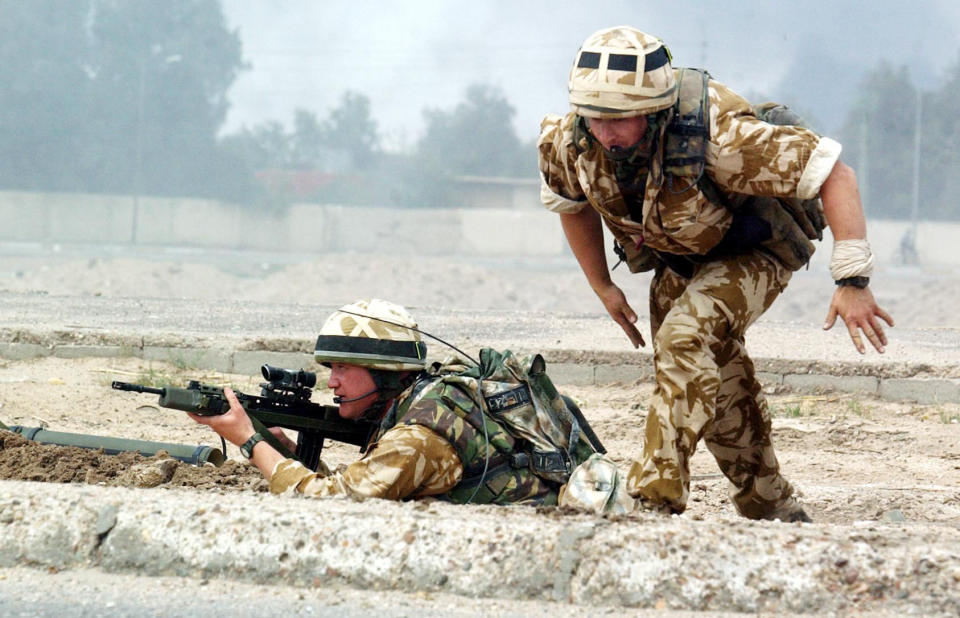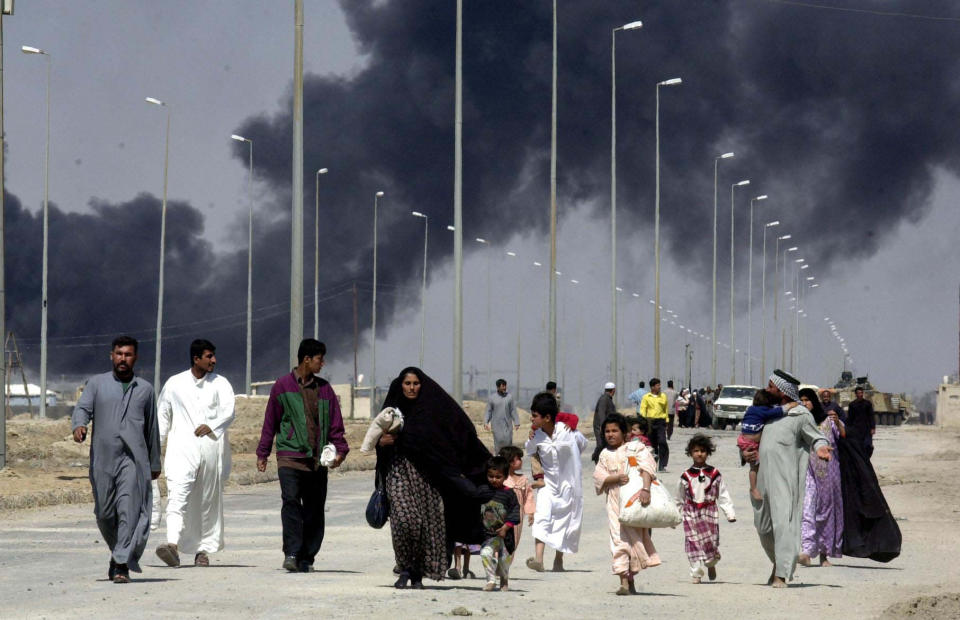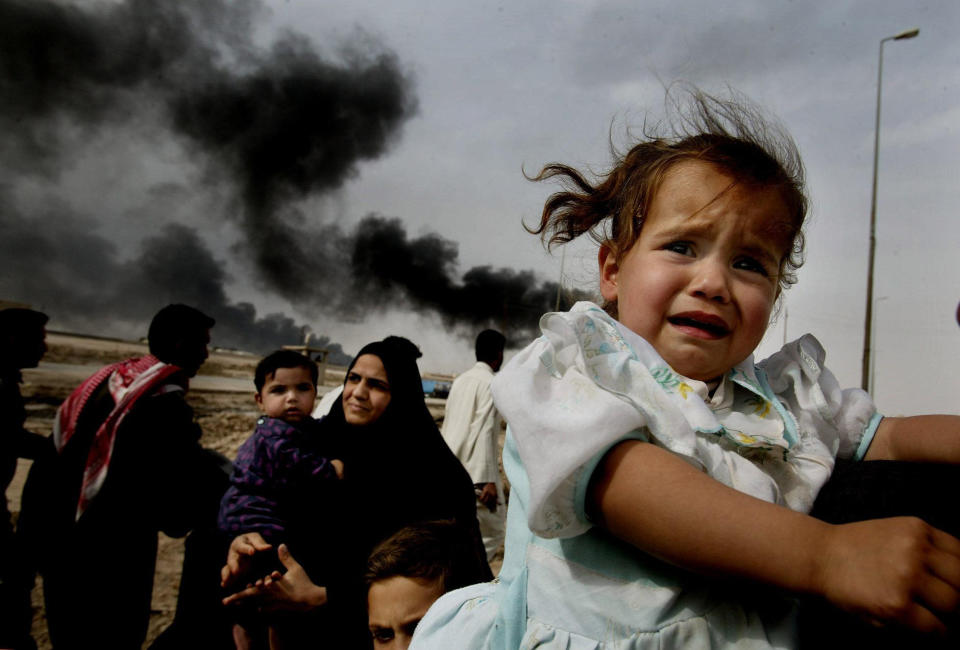Iraq War anniversary: What lessons have been learnt?
Looting was rampant: When I asked a shopkeeper how he protected his goods, he produced a tripod-mounted machine-gun.

March 20 marks the 10th anniversary of the start of the Iraq war. Justin Huggler, a former correspondent for 'The Independent' who reported from Iraq, looks back and asks what lessons have been learnt...
On my first day in Iraq I saw a bus full of passengers being held up by armed bandits, I witnessed an American tank firing across a busy motorway, and I had to break off an interview and leave in a hurry when my translator told me two men were discussing whether to kill me.
And the war was supposed to be over. When I arrived in Iraq as a reporter in the summer of 2003, the statue of Saddam Hussein had been pulled down and President George W Bush had made his famous "Mission Accomplished" speech. In theory, the country was under control. But it was already clear that things were going badly wrong.
[Related: Iraq War anniversary: A decade on and conflict continues to cast a shadow over the UK]
Baghdad was a terrifying place. If you forgot to lock your car doors, carjackers would get in next to you at a red light, shoot you dead and dump your body in the streets. No one knew the murder rate, but the morgues were overflowing.
The children of wealthy Iraqis were kidnapped and held for ransom. Looting was rampant: when I asked a shopkeeper how he protected his goods, he produced a tripod-mounted machine-gun.
While we were still discussing whether the war should have happened, in Iraq events had moved on at a frightening pace. The country was collapsing into lawlessness and violence, and the Americans and British seemed powerless to prevent it.

Now, 10 years on, we're still debating whether the war should have happened. In that time, Iraq has suffered an even more devastating civil war which left its society divided and scarred. The effects are still spreading across the region, into neighbouring Syria.
The lawlessness of Iraq in 2003 was the perfect breeding ground for insurgency. Almost every household in the country owned a Kalashnikov, and huge amounts of weaponry and explosives were looted from Iraqi army stores. There were daily ambushes on American patrols in Baghdad, and we learned to keep our distance for fear of being caught in the crossfire.
It was the suicide bombing at the United Nations' Baghdad office which captured the headlines in the summer of 2003. But the assassination of a prominent Iraqi Shia cleric days later would arguably prove more significant: the insurgents weren't just targeting Westerners, they were killing Iraqis.
The majority of Iraqis were Shia Muslims, who had long been oppressed under Saddam, while the Sunni minority were in control. Now the Shia wanted to assert themselves - but the Sunni insurgents wanted to stop that at any cost.
Iraqi society was dividing and the battle lines were being drawn for civil war. But the Americans and British were too busy fighting for their own survival to do much about it.
In early 2004, I drove to a hospital south of Baghdad to interview a doctor. The moment he saw me, his face turned pale. "You've got to leave," he told me. "It's not safe for you. And it's not safe for me to be seen with you. They're hunting you."
Al-Qaeda supporters from other Arab countries were in the area, he said, looking for Westerners to kidnap.
Weeks later, I was on the same road south of Baghdad when the car behind started signalling frantically for us to stop. The driver and passenger's faces were hidden in headscarves. My driver, Mohammed, sped up, and the other car chased us, weaving through the traffic at 120mph. Thankfully, we lost them.
Iraq was a lawless, wild place where the Americans and British could do nothing to protect you. The Al-Qaeda supporters were so entwined with the Iraqi Sunni insurgents, it was difficult to tell them apart.

In March 2004, the Shia held their annual pilgrimage to Karbala, which had been banned under Saddam, for the first time in decades. A million people streamed into the small city. I was in the main street when I got unnerved by the crowds and ducked into a side alley.
It was a lucky attack of nerves: moments later there was a muffled explosion and screaming from where I'd been standing. The insurgents had fired a mortar into the middle of the crowd, cutting down people where they stood. More explosions followed. In less than an hour, more than 170 were dead.
The Shia were not helpless victims. They had their own heavily armed militias, and they were ready for a fight. When the Americans tried to shut down one of the militias, the Mahdi Army, it started an uprising across the south.
At the same time, Sunni insurgents had lured a group of American security contractors into an ambush in Fallujah and beaten them to death. The US had to respond.
Soon the Americans found themselves fighting on two fronts, against the Sunni in Fallujah and the Shia in the south. Basra, where British forces were based, was still relatively peaceful, but most of the country was on fire. If the insurgents had no chance of defeating the Americans or British in battle, they could make Iraq an ungovernable hell.
By the time the civil war began, both Sunnis and Shia were battle-hardened veterans, who had fought street by street against far better armed Western troops.
A headless body was found hanging from a bridge in Baghdad. Shortly after a video emerged of Nick Berg, a young American businessman who'd come to work on reconstruction, held down by masked men while he was beheaded with a knife. The kidnapping crisis had begun.
More videos followed, and you were taking your life in your hands by venturing onto the streets. Understandably, Western attention focused on our troops fighting running battles in the streets and our civilians being murdered. But all the while Iraq was moving inexorably towards civil war.
Anyone who worked for the Americans, even as a cleaner, was targeted. Suicide bombers drove car bombs into people queuing for work.
The small Iraqi Christian minority got letters pushed under their doors warning them to leave the country or be killed.

Iraq was dividing on partisan lines: the Kurdish north, the Sunni centre and the Shia south. But Baghdad had always been mixed, and it was dividing neighbourhood by neighbourhood. Insurgents started setting up their own roadblocks and pulling people out of cars. Iraqis could be killed for living in the wrong part of town, working for the wrong people, driving down the wrong street.
It was clear the Americans and British would not stay forever, and the Iraqis were getting ready for the battle for control once they were gone.
By the time the civil war began, all the Americans and their allies were looking for was an exit strategy.
If the civil war appears to be over in Iraq today, the country is still riven by the same divisions. As many as four million people are believed to have been displaced from their homes in the civil war. Reliable estimates put the total death toll since 2003 at more than 100,000.
And across the border, now neighbouring Syria is being torn apart by its own civil war.
It's not just the government forces of President Bashar Assad against the Syrian rebels, it's Sunnis against Shia again. Assad and his senior regime officials come from a Shia minority, and the same Al-Qaeda supporters who flocked to Iraq are now streaming into Syria to join the fight.
Ten years on, we're still asking whether the war should have happened, while the Middle East is in flames.
:: Justin Huggler has written a fictional novel inspired by his experiences in Iraq. Burden Of The Desert by Justin Huggler is published by CreateSpace Independent Publishing Platform, priced £12.99, is available now.

 Yahoo News
Yahoo News 

